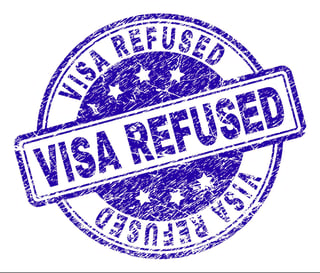South Africa's visa application and approval process, particularly for work visas, has come under criticism for its complexity and inefficiency. This article delves into the key reasons behind visa refusals in South Africa and their broader consequences.

Between 2015 and 2021, South Africa approved only 16,097 critical skilled-worker permits, averaging just over 2,200 approvals per year. This results in a concerning rejection rate of 52%, despite the country's evident skills deficit. Additionally, the rejection rate for business visas during this period is even higher, standing at 68%.
South Africa's laborious visa process has discouraged foreign investment. Some German companies have opted to sell their South African subsidiaries due to difficulties in obtaining executive work permits. These challenges impede the country's ability to attract foreign direct investment, hindering economic growth.

The refusal of work visas, especially for skilled workers, worsens the skills gap in South Africa. This issue is particularly evident in sectors like electricity and transportation, where technicians face hurdles in obtaining work visas. This, in turn, contributes to maintenance and construction problems at critical parastatals such as ESKOM and TRANSNET.
Obtaining a South African work permit entails navigating numerous bureaucratic hurdles, making the process arduous and time-consuming:
The primary avenue for work permits is the critical skills process, based on the Department of Labour's checklist. However, this list of 140 critical skills is incomplete and does not adequately address the evolving economic landscape.
Employers must substantiate that no local citizen or permanent resident possesses the required qualifications, skills, and experience. This requirement, coupled with high advertising costs, significantly increases the overall expense of the application process.
Applicants must have their qualifications verified by the South African Qualifications Authority, which often takes over six months. Furthermore, registering with professional bodies in South Africa, a prerequisite in many fields, presents considerable challenges.
Alt tag:

Securing an application appointment can take up to three months. Even after applying, processing times frequently exceed the promised eight weeks, occasionally stretching beyond a year.
Visa rejections are occasionally based on spurious reasons, such as claims of 'missing documents.' The appeal process is limited, leaving expensive legal challenges as the only viable recourse.
Certification of documents by a Commissioner of Oaths is valid for only three months. Delays in processing can result in document expiration and visa refusals.
Visa-related challenges extend to short-term visitor and business visas, dissuading organizations from hosting events and meetings in South Africa. Consequently, the country experiences a loss of revenue from the lucrative event and conference business.
Spouses of critical skills visa holders are prohibited from working in South Africa, necessitating a pause in their careers. The alternative option is applying for permanent residence, a protracted process that can take at least five years.
Studies have indicated that immigrants can have a positive impact on South Africa's GDP per capita and employment rates. Restrictive visa policies hinder the country from harnessing this potential for economic growth and development.
To address these challenges and unlock South Africa's potential, reforms are urgently required. Recommendations include:
Visa application processes can be both challenging and expensive. Bonalumi highlighted some key aspects of visa applications that travelers should be aware of:
The cost of theSouth Africa visaapplication itself can range from R500 to R1,500, and this fee is typically non-refundable. It's important to budget for this expense when planning an international trip.
In many cases, visa requirements may include pre-booking flights and accommodation before submitting the application. This can add a significant financial commitment to the process and underscores the importance of thorough trip planning.
In conclusion, South Africa's visa refusal system presents significant obstacles to foreign workers and investors. Streamlining and reforming this process are imperative for the country to attract international talent, promote economic growth, and remain competitive in the global market.
Why are South African visas sometimes denied?
Visa denials in South Africa can occur for various reasons. Here are some common factors leading to visa refusals:
Why do South Africa often reject visa applications?
South African visa rejections are relatively common, as immigration officers rigorously screen applications to ensure that only legitimate travelers enter the country. If you have any questions regarding your South African visa application, it is advisable to seek clarification.
What is the primary cause of visa rejections?
Incomplete or inconsistent visa applications are a leading cause of rejection. If there are blank sections in the application form or discrepancies between the information provided and your passport or supporting documents, your visa may be rejected.
How can one appeal a South African visa refusal?
In the event of a visa denial, you have the option to appeal the decision and request that the Director General reviews your application along with any supporting documents. The appeal must be submitted within specific timeframes, typically within 10 working days under section 8(4) or 20 working days.
Is obtaining a South African visa a challenging process?
Obtaining a South African visa can be a relatively straightforward process with a typical processing time of 5 to 7 business days when applying in person at an application center. However, unforeseen events or errors in your application could lead to delays or even a visa denial.
Is it common for visa applications to be rejected?
Visa rejections can occur when applicants fail to demonstrate their eligibility to visit a particular country. This is often due to the omission of essential information or the absence of required documents.
Step1: Complete the online application by providing your passport details.
Step2: Submit payment online using a credit card.
Step3: Monitor your email for confirmation of payment and receipt of your eVisa, which will be sent electronically.
To help us improve